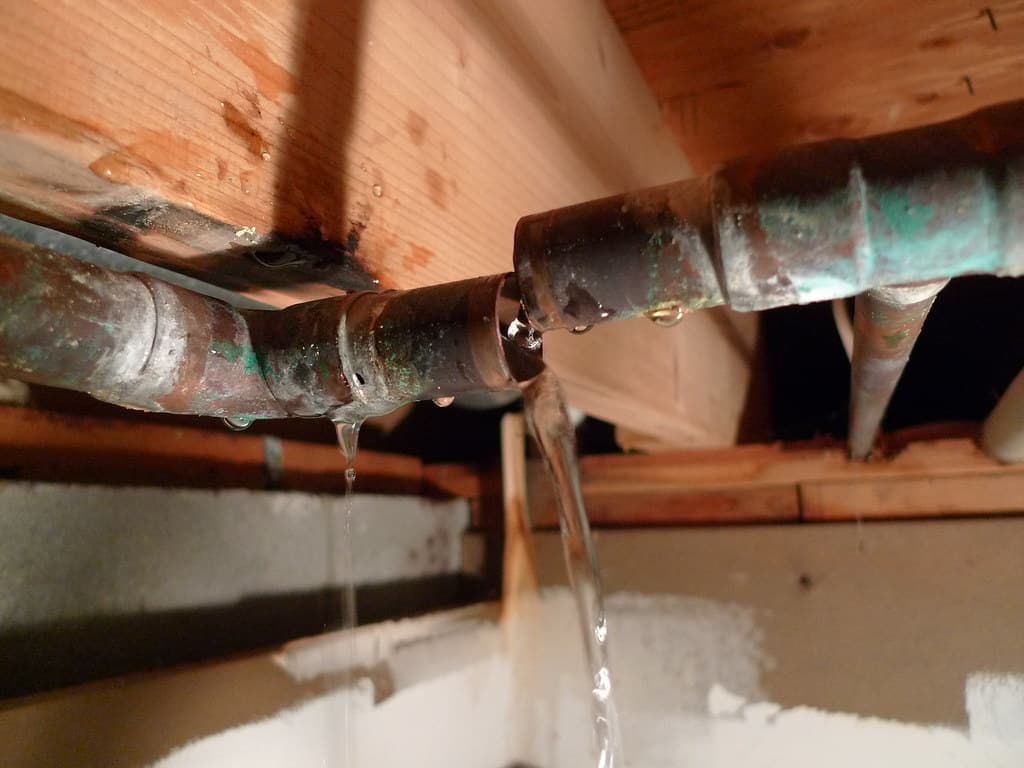From the user side of things, plumbing is about as simple as it can be. You turn on a tap when you want water, and when you’re done with it you turn it off. You plug the drain when you want the sink to fill up, and you remove the plug when it’s time to empty it.
But because it seems so simple on the surface, it’s easy to forget just how complex plumbing can be.
If you have a plumbing leak, it can cause some major damage to the structural integrity of your home. Even a simple leaky pipe can end up catastrophic.
But even if it’s just a matter of a leaky faucet, the dripping water going into your drain can still end up being quite expensive and cause damage.
Here At Mount Airy Plumbing, our experienced Philadelphia plumbing contractors can help.
If you have a residential plumbing or commercial plumbing leaky pipe issue, we’ll be there.
How To Tell If You Have A Plumbing Leak
The most obvious sign of a plumbing leak is when you see a leaky pipe or faucet. However, if you have a leak that lives behind one of your walls or in a part of your basement that you don’t visit very often, it can be easy to miss until it’s been dripping for a while and has already caused major damage.
Here are some of the signs you may have a plumbing leak:
Low Water Pressure
If you turn on your faucets and find the water isn’t coming out as quickly as usual, it could be a sign of a leak.
Increased Water Bill
If your water bill is increasing and you can’t pinpoint a reason why, it might be a water leak that’s costing you.
Mold Growing
A leaky pipe increases moisture, creating the perfect condition for mold to grow. Fix the leak, and the mold will leave as well
What Causes Leaky Pipes?
You might have leaky pipes for a number of different reasons.
In some cases, a substance that isn’t properly flushed through into the sewer system – perhaps because of a main sewer line drain clog – can cause corrosion. In particular, using chemical drain cleaners can cause the inside of your pipes to corrode. over a long enough span of time, this can cause your pipes to leak
It can also be an issue from the gaskets holding your pipes together. Once they wear away, it can cause a leak at the point where your pipes connect together.
Your water pressure might be too high, as well, which puts more stress on your pipes than is necessary and can cause leaks to spring out.
Regardless of what’s causing your leak, however, we can help.
Leaky Pipe FAQ
Do you have questions about Philly leaky pipe repair? If so, we’re here to help. Below you’ll find some of the most frequently asked questions about leaky pipe repair.
You can also check out our general FAQ page, or feel free to send us a message, we’re happy to help.
The easiest place to check for bathroom leaky pipes is the space under your sink. Check that area for moisture build-up.
You can also check your toilet for leaks, but those tend to be more dramatic and pretty easily noticeable.
Otherwise, check around your bathtub and shower.
Just like with your bathroom, the most likely source for a leaky pipe in your kitchen is the kitchen sink. Check the cupboard underneath your sink and look for moisture.
You may also have a pot filler set up, in which case you should check the cupboard underneath that as well.
It could be that your dishwasher is leaking, or your fridge if you have one that has a drinking water dispenser attached to it, but just like your toilet, these tend to be more dramatic leaks and it’s hard to miss them.
Watch for unexplained water damage! If you notice moisture building up behind your wall, call a 24 hour emergency plumber right away.
The first step is to immediately go to your main water shut off valve is, and turn it off. Yes, this does turn off all running water in your house, but it will also stop the problem from getting any worse.
Next, call Mount Airy Plumbing!
One of the easiest ways to prevent plumbing leaks in your home is to keep up with plumbing maintenance. For example, if you have an old faucet, you may want to consider replacing it even if water does still flow out of it, since it might be difficult to find the parts you need to repair it.
It’s also a good idea to be mindful of what you store in the cabinets where your plumbing is. If you stuff these cabinets too full, it can cause leaks.
Yes, absolutely. As water leaks out of your pipes, it can cause corrosion, slowly widening the hole.
